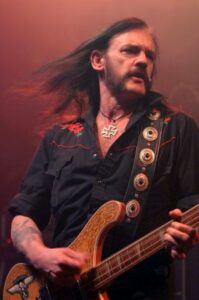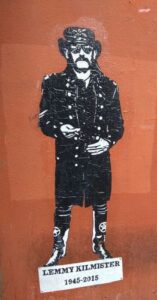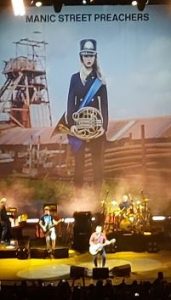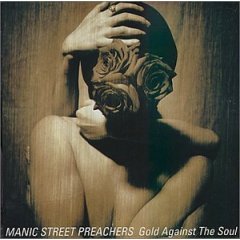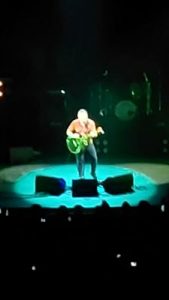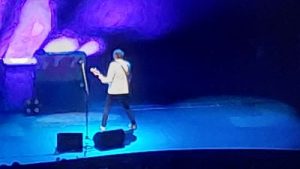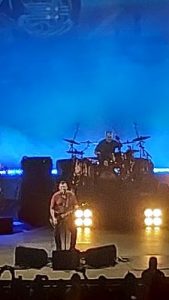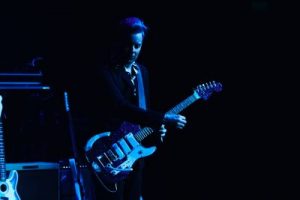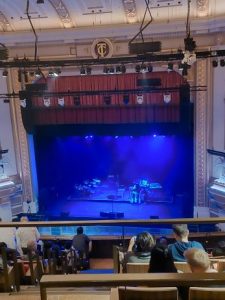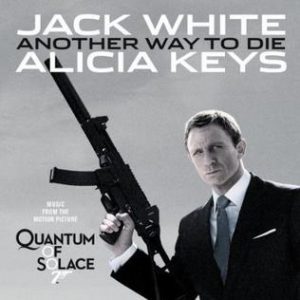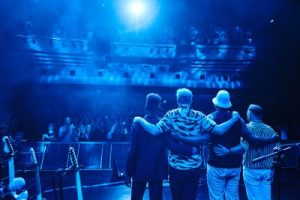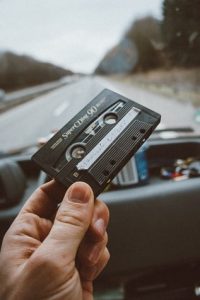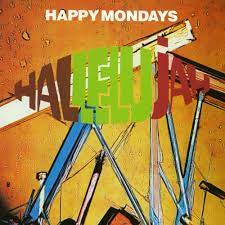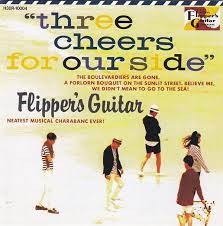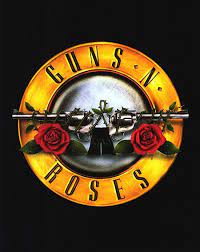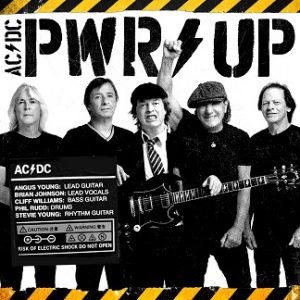
I’ve had a hellishly busy week. That’s why this report on Singapore’s big musical event of the month is reaching you nine days late…
It was with misgivings that I bought a ticket for the concert by the legendary – not always legendary for the right reasons – hard rock / heavy metal band Guns N’ Roses at Singapore’s National Stadium on November 12th.
Like many things in Singapore, the ticket was not cheap and, given Guns N’ Roses’ reputation for pissing off gig-goers, I wondered if I would get anything near my money’s worth. I knew about, for example, their notorious 1992 appearance in Montreal when, thanks to both coming onstage late and leaving it early, they triggered a riot. (“Come Monday morning, the mayor was looking for apologies and fans were looking for refunds.”) Or their performance at the O2 in Dublin in 2010 when, after another late arrival onstage had angered the crowd, they played for 20 minutes, then walked off, and only returned an hour later after being strong-armed by the event organisers, by which time many fans had given up and gone home.
This year, the band was still being associated with crappy concerts. Two July spots at the Tottenham Hotspur Stadium in London suffered from “appalling sound, everything was muffled, couldn’t hear Axl’s voice, the support act was cancelled, GNR came on real late, kept fans later, no apologies, fans walking out.” Their next scheduled gig, in Glasgow, was then cancelled ‘due to illness and medical advice’.
Meanwhile, I’m not a fan of stadium rock shows, where the venue’s scale and the distance between most punters and the stage kill any sense of intimacy. And I was not enthused about seeing a band at Singapore’s National Stadium because I’d read some complaints about it on Trip Advisor. The main gripe was that the place doesn’t let people bring food or drink onto the premises, obliging them, inside, to spend ages waiting in queues at the stadium’s vendors, where refreshments are sold at predictably high prices.
I had to work on November 12th until six o’clock. As Guns N’ Roses were officially due onstage at seven – “Huh,” jeered a colleague, “do you really expect Axl Rose to come onstage at seven?” – I hopped on a taxi and went straight to the stadium lugging a knapsack full of important work material. This meant I had to spend a couple of minutes at a security desk outside one of the stadium’s entrances while a lady went through every nook and cranny of the knapsack, rummaging among papers, books, stationery, my (empty) lunchbox, etc., with airport-style thoroughness. But that security lady was undeniably chatty and pleasant.
Having made it inside, at about 6.50, I joined a queue to get some beer – also airport style, with lines of people threading through twisting passages formed by retractable-belt stanchions – and spent the next 20 minutes glancing nervously down into the arena and at the distant, empty stage, hoping that Axl Rose and co. would come on a little late. I also feared that the beer would have run out by the time I reached the counter, although I was reassured when a guy propelled a trolley past me, laden with crates of Tiger beer, in the direction of the vendor. Presumably much needed.


Each customer, incidentally, was allowed to buy a maximum of four alcoholic beverages at a time. If you purchased four Tiger beers – as I did, not wanting to experience that queue a second time – these came in four plastic glasses planted in an eggbox-like tray. Transporting them without spilling anything, down to my seat near the bottom of one of the terraces, required mind-reader levels of concentration. Furthermore, I had to decide where to stash those drinks when I reached the seat. The only space for them was on the floor between my feet, which meant I spent the gig reminding myself, “Keep your legs apart! Keep your legs apart!”
Most of the stadium is roofed over. Only one section of it, directly opposite the stage, is exposed to the elements. The cheapest concert-tickets were for seats in that open area but, this being the wettest month in the Singaporean calendar, I’d decided not to risk it. There’d been a downpour earlier that day and, sitting there, it was possible that whilst listening to Guns N’ Roses performing their famous ballad November Rain, you’d be subjected to November rain for real. Thankfully, the bad weather held off that evening. The show’s most expensive tickets, meanwhile, were for the pitch, which was beyond the barrier a few rows below where I was sitting. Spectators there could snuggle against the front of the stage. Also, they were enviably unconstrained by having rows of seats all around them and could dance and jump and jig around as much as they liked. Although the folk passing on the other side of the barrier, heading towards the stage, seemed to be mainly moneyed, middle-aged expats and I doubted if Axl and the gang would be looking down on much mosh-pit action tonight.


So, there I was, weary from a long day at work, jaded after waiting in a lengthy refreshments queue, worried that an accidental twitch of my foot might knock over my hard-won quartet of beers, and wondering if the evening ahead would prove to be a giant waste of money. Then, at 7.30, the lights dimmed and… The general stadium-crowd roared with excitement. The well-heeled crowd pressing against the stage-front suddenly became densely spangled with light as hundreds of smartphone-cameras sprang into action. From the speakers rushed the blood-stirring chords of It’s So Easy, a song on the first and best Guns N’ Roses album Appetite for Destruction. And on the towering screens that flanked the stage, there appeared… Axl Rose! Duff McKagan! Slash! Or as someone sitting near to me exclaimed, “Sla-a-a-a-ash!”


I’d seen footage of Axl performing a few years ago, as temporary vocalist for AC/DC, and he’d looked worryingly porky. But he’s slimmed down since then and is in decent shape again. McKagan looked admirably lean and mean. As for Slash… Well, he’s evidently been putting too much middle-age spread on his sandwiches lately, not that the excess pounds affected his guitar-playing. He and Jacob Rees-Mogg remain the only two men on the planet in 2022 who aren’t embarrassed to wear top hats in public.
While Axl, Duff and Slash loomed large on the screens, I wondered why Dizzy Reed didn’t appear on them too. Keyboardist Reed, after all, has been in Guns N’ Roses since 1990. He remained in the band after Slash, Duff, guitarist Gilby Clarke and drummer Matt Sorum quit in the 1990s, and he even stuck with Guns N’ Roses throughout the seemingly never-ending recording of the Chinese Democracy album, finally released in 2008. This was when Axl operated a ‘revolving door’ policy regarding Guns N’ Roses membership – though guitarist Richard Fortus and drummer Frank Ferrer, recruited during this period, remain in the present line-up – and, apart from Reed, the band sometimes seemed to consist of Axl ‘and your granny on bongos’. So where was Dizzy? Did he have a hump on his back or a wart on his nose that made his bandmates too ashamed to show him off? It wasn’t until halfway through proceedings that Axl announced ‘Mr Dizzy Reed on keyboards’, and the screens finally gave us a glimpse of this elusive but long-time and loyal bandmember. I snatched a picture of the moment. Here’s Dizzy!

This evening, Guns N’ Roses played 27 songs over three hours, a very pleasant surprise. Considering some of those notorious past performances, I feared I might get three songs in 27 minutes before they called it a night. The lengthy setlist did have a few drawbacks, though. It meant we were treated to the whole musical smorgasbord that is the Guns N’ Roses experience, which in my opinion contains a few lows as well as numerous highs. There were a few too many wibbly, wanky guitar solos designed to remind us that Slash hasn’t lost his musical prowess, as if anyone needed reminding. That said, it was fun when he did an instrumental workout of Albert King’s Born Under a Bad Sign.
Also, though the setlist was weighted towards their late 1980s / early 1990s stuff, with a half-dozen songs coming from the mighty Appetite for Destruction, it was inevitable that something would slip in from the long-awaited, then much-derided Chinese Democracy. I actually like the title track, which they bravely served up immediately after It’s So Easy at the start. But the same album’s Better, which came a few songs later, just sounded a mess.
And then there were the ballads. I realise that every heavy metal band in the world feels obliged to record a ballad now and again – well, every mainstream heavy metal band, as I don’t recall Cannibal Corpse ever recording something slow and smoochy to keep the ‘lay-deez’ sweet – but there is something about your average Guns N’ Roses ballad that sets my teeth on edge. Probably it’s Axl’s voice, a melodramatic beast at the best of times. When it’s emoting through the likes of Don’t Cry from the 1991 album Use Your Illusion I, for which tonight Axl donned a show-bizzy silver-lame jacket, I find it hard going indeed.

But my least favourite Guns N’ Roses ballad is the afore-mentioned November Rain, also from Use Your Illusion I, which seems to drone on forever. Two hours into the set, the song hadn’t been played, and I began to entertain hopes that I’d get through the evening without hearing it. Maybe the band would forget to play it? But no. Axl sat down at a piano and began tinkling its ivories and the bloody thing started. At this point, a large percentage of the crowd, who thought November Rain was the best thing ever, sprang to their feet and started waving their lighters, or phone-lights, en masse in the air above their heads. This made me feel like I’d suddenly been teleported into a Bryan Adams concert just as Bryan was starting to sing Everything I Do, I Do It for You (1991). At least, for this rendition of November Rain, Slash didn’t attempt to play his guitar on top of Axl’s piano, as he’d done in the song’s video.

But enough of the negatives. What of the positives? Well, there were plenty. Lots of spiffing tunes off Appetite for Destruction for a start: Welcome to the Jungle, Nightrain, Rocket Queen, etc. Though for some reason not Mr Brownstone, which, the show’s official statistics tell me, makes this the band’s first gig since 1993 that they haven’t played the song.
I was also pleased that they treated the crowd to their bombastic cover versions of Wings’ James Bond theme Live and Let Die (1974) and Bob Dylan’s Knockin’ on Heaven’s Door (1973). Yes, they throw all subtlety and nuance out of the window and, basically, murder both songs – but they murder them gloriously. For Knockin’ on Heaven’s Door, Axl put on a cowboy hat, which made me wonder if he was acknowledging the fact that Dylan originally wrote the song for the soundtrack of Sam Peckinpah’s masterly western Pat Garrett and Billy the Kid (1973).
Splendid too were their covers of the Who’s The Seeker (1970) and the Stooges’ I Wanna Be Your Dog (1969). The latter was sung by Duff McKagan with the instrumentation stripped back and it made for an impressively intense couple of minutes. Commendably, McKagan wore a Motörhead T-shirt for part of the show. Also, by coincidence, I’d just finished reading Sing Backwards and Weep (2020), the autobiography of the late, great grunge singer Mark Lanegan, in which Lanegan credits McKagan with helping to rescue him from homelessness and drug addiction in the late 1990s. An all-round top bloke, then.

And I was very happy that, for the third song of their set, they performed Slither (2004) by the underrated Velvet Revolver, the group Slash, McKagan and Matt Sorum formed with Scott Weiland of the Stone Temple Pilots during their estrangement from Guns N’ Roses.
Even with 27 songs played, it was inevitable that they missed out a few things I’d have loved to hear. They performed nothing off their album of punk and hard-rock covers, The Spaghetti Incident? (1993), which nobody in the world seemed to like apart from myself. Their boisterous version of the UK Subs’ Down on the Farm (1982), which Axl sings in a hilarious ‘Mockney’ accent, would have slotted in nicely tonight.
And I’d have welcomed a rendition of the sweary, vitriolic and exhilarating Get in the Ring, off their other 1991 album, the imaginatively titled Use Your Illusion II. Get in the Ring is basically a rock ‘n’ roll update of the Scottish poetic tradition of flyting. It contains such lyrics as “I got a thought that would be nice / I’d like to crush your head tight in my vice,” and takes aim at all the “punks in the press” who “want to start shit by printing lies instead of the things we said… Andy Secher at Hit Parader, Circus Magazine, Mick Wall at Kerrang!, Bob Guccione Jr at Spin…” If they updated that shit-list for 2022, which modern-day journalists would be on it, I wonder?
Oh well. You can’t have everything, I suppose.
As the band took the stage at 7.30 that evening, and as everyone around me went wild, it occurred to me that this was the first time in almost two years I’d been at a concert. After all the restrictions imposed by that cursed bloody virus, it felt marvellous to experience live music again. Yes, I had a massive, uplifting sense of joy and relief… Just because I was seeing Axl Rose and the crew amble into view on two giant stadium screens. Not something I ever expected to happen, but it did. Thanks, guys!


